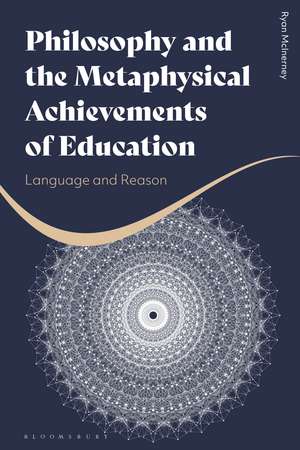Philosophy and the Metaphysical Achievements of Education: Language and Reason
Autor Ryan McInerneyen Limba Engleză Paperback – 25 ian 2023
| Toate formatele și edițiile | Preț | Express |
|---|---|---|
| Paperback (1) | 189.53 lei 6-8 săpt. | +68.27 lei 6-10 zile |
| Bloomsbury Publishing – 25 ian 2023 | 189.53 lei 6-8 săpt. | +68.27 lei 6-10 zile |
| Hardback (1) | 567.25 lei 6-8 săpt. | |
| Bloomsbury Publishing – 14 iul 2021 | 567.25 lei 6-8 săpt. |
Preț: 189.53 lei
Preț vechi: 248.39 lei
-24% Nou
Puncte Express: 284
Preț estimativ în valută:
36.28€ • 37.32$ • 30.10£
36.28€ • 37.32$ • 30.10£
Carte tipărită la comandă
Livrare economică 19 februarie-05 martie
Livrare express 14-18 ianuarie pentru 78.26 lei
Preluare comenzi: 021 569.72.76
Specificații
ISBN-13: 9781350185180
ISBN-10: 1350185183
Pagini: 168
Dimensiuni: 156 x 234 x 25 mm
Greutate: 0.25 kg
Editura: Bloomsbury Publishing
Colecția Bloomsbury Academic
Locul publicării:London, United Kingdom
ISBN-10: 1350185183
Pagini: 168
Dimensiuni: 156 x 234 x 25 mm
Greutate: 0.25 kg
Editura: Bloomsbury Publishing
Colecția Bloomsbury Academic
Locul publicării:London, United Kingdom
Caracteristici
Creates a dialogue between analytic and continental philosophical influences in contemporary educational philosophy
Notă biografică
Ryan McInerney is Sessional Lecturer in the Department of Philosophy at Lakehead University, Thunder Bay, Canada.
Cuprins
Preface Overture: What Are Philosophical Theses?Chapter 1. Education and Philosophy: A Crisis of Self-IdentityChapter 2. Education and Metaphysics: Being at Home in the WorldChapter 3. Education and History: Out into the Midst of BeingChapter 4. The Structure of Educational Ideals: Transcendental Origins, Impossible AimsChapter 5. Education and Transcendence: At Home in Unheimlich LanguageCoda: Waking Being to ThinkingReferencesIndex
Recenzii
This is a consistently provocative and absorbing book. McInerney argues, clearly and convincingly, that reality is the home of thinking, that philosophy orients us to reality, and that education works to help that orientation take place. The importance of philosophy of education could hardly be set out better.
This book is a tour de force. Ryan McInerney sets out to reveal the metaphysical significance of education as a defining component of the human condition. To this end, he explores education's role in the cultivation of the conceptual powers that enable us to engage with reality as an object of theoretical understanding, and as a source of mystery and wonder. McInerney treats with great sensitivity philosophy's propensity to assert the limits of what can be thought and represents education at its best as awakening in students the desire to explore, and sometimes to transcend, conceptual boundaries. In this way, education must aspire to two ends that stand in an uneasy relation with one another: to make students "at home in the world" and to disclose the Unheimlichkeit (uncanniness) of being. Notwithstanding these grand themes, McInerney never forgets the real life of educational practice and he provides a thoughtful analysis of philosophy of education's attempt to respond to the instrumentalism and managerialism that infects so much contemporary educational policy and practice. McInerney shows great respect for language, both in his treatment of language as a vehicle of reason, and in the manner of his writing, which combines clarity and rigor with an engaging lyricism.
This book is a tour de force. Ryan McInerney sets out to reveal the metaphysical significance of education as a defining component of the human condition. To this end, he explores education's role in the cultivation of the conceptual powers that enable us to engage with reality as an object of theoretical understanding, and as a source of mystery and wonder. McInerney treats with great sensitivity philosophy's propensity to assert the limits of what can be thought and represents education at its best as awakening in students the desire to explore, and sometimes to transcend, conceptual boundaries. In this way, education must aspire to two ends that stand in an uneasy relation with one another: to make students "at home in the world" and to disclose the Unheimlichkeit (uncanniness) of being. Notwithstanding these grand themes, McInerney never forgets the real life of educational practice and he provides a thoughtful analysis of philosophy of education's attempt to respond to the instrumentalism and managerialism that infects so much contemporary educational policy and practice. McInerney shows great respect for language, both in his treatment of language as a vehicle of reason, and in the manner of his writing, which combines clarity and rigor with an engaging lyricism.
